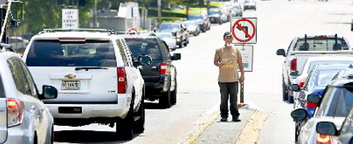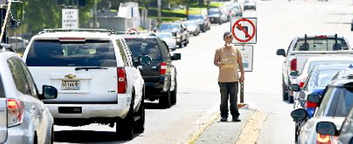PORTLAND — The courts will decide the constitutionality of Portland’s recently approved ordinance prohibiting anyone from standing, sitting, driving or parking on a median strip within city limits. But the law, commonly touted by supporters and officials as a simple, non-discriminatory safety measure, seems to unfairly target the poor and homeless who use street medians as a place to panhandle.
Although the citywide measure does not specifically refer to panhandling in any direct way, the ban on loitering in medians specifically targets panhandlers. It’s both a thinly disguised attempt to stamp out panhandling and a way to make the epidemic of poverty and homelessness less visible to the public eye.
In response to the panhandlers located in street medians, Portland Chamber of Commerce spokesman Chris O’Neill has stated, “Like it or not, it’s just not the image the business community or the community at large wants to portray.”
Unfortunately, this new ordinance does not help to eradicate poverty and homelessness; it only frees the Portland community from having to see and think about it.
The increase in panhandling is the latest, most visible sign of a growing problem that warrants attention. According to U.S. Census Bureau figures for 2012, the Maine poverty rate for adults aged 18 to 64 is 14.8 percent, while the poverty rate of children is 22.6 percent.
In Portland specifically, the number of homeless people counted on a single night in January each year has nearly doubled from 276 in 2009 to 480 this year. Panhandling is not only a way for Maine’s poor to solicit monetary donations; it also is a visible sign for residents that poverty is alive and thriving in their immediate communities.
Without exposure, a platform for addressing the issue of poverty, and thus its solutions and ramifications, is suppressed. A problem does not simply go away because it is hidden.
The citywide ban on median panhandling not only diverts public attention from the epidemic of poverty, it also incorrectly places the blame of poverty and homelessness on the affected individuals rather than on the institutional structures that continue to perpetuate and condone it.
The structural oppression of the poor impacts both those who live in poverty and those who do not. The interconnectedness of systems within communities implies that what directly affects one will, in turn, directly affect the other.
In Portland, the ramifications of using a criminal justice-driven approach to the social issue of poverty will affect not only the panhandlers it targets, but also the greater community. The city will suffer as more proactive solutions such as providing housing and health care no longer become the benchmark.
The national trend of enacting laws to address social issues is rising. According to a 2011 study by the National Law Center on Homelessness and Poverty, prohibitions on begging and panhandling, and loitering in particular public spaces had increased 7 percent and 10 percent, respectively.
The criminalization approach is gaining traction due to a lack of funds for social services on national, state and local levels. The negative effects of using law enforcement to address volatile social problems will only exacerbate the situation because such tactics fail to address underlying problems.
When criminal justice measures are employed, they only serve to add to the fortress of structural oppression, making it impossible to view poverty and homelessness through a more sustainable, holistic lens.
By implementing a ban on median loitering and panhandling, Portland is allowing the structural oppression of those facing poverty and homelessness to continue.
While the effects of the ordinance may seem to have a direct and visible change in the amount of poverty Portland residents are subjected to, the indirect repercussions will be far more debilitating. As opposed to using a reactionary approach to the social issue of poverty, Portland needs to take a stand in implementing more forward-moving measures.
— Special to the Press Herald
Send questions/comments to the editors.




Success. Please wait for the page to reload. If the page does not reload within 5 seconds, please refresh the page.
Enter your email and password to access comments.
Hi, to comment on stories you must . This profile is in addition to your subscription and website login.
Already have a commenting profile? .
Invalid username/password.
Please check your email to confirm and complete your registration.
Only subscribers are eligible to post comments. Please subscribe or login first for digital access. Here’s why.
Use the form below to reset your password. When you've submitted your account email, we will send an email with a reset code.